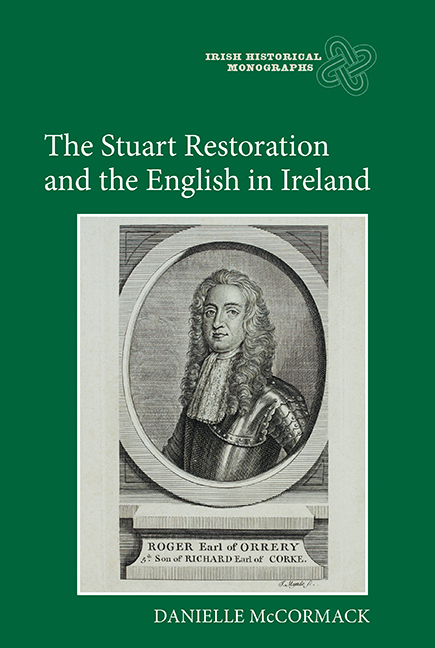Book contents
- Frontmatter
- Contents
- Miscellaneous Frontmatter
- Acknowledgements
- List of abbreviations and conventions
- Introduction
- 1 The political and mental map of 1660s Ireland
- 2 Stuart restoration and the beginnings of Protestant discontent
- 3 Roger Boyle, earl of Orrery, and the evolution of English Protestant identity in Ireland
- 4 Moral and rhetorical challenges to Protestant power
- 5 Charles II and his ministers in Ireland
- 6 The court of claims, popery and Stuart authority
- Conclusion
- Bibliography
- Index
2 - Stuart restoration and the beginnings of Protestant discontent
Published online by Cambridge University Press: 05 July 2016
- Frontmatter
- Contents
- Miscellaneous Frontmatter
- Acknowledgements
- List of abbreviations and conventions
- Introduction
- 1 The political and mental map of 1660s Ireland
- 2 Stuart restoration and the beginnings of Protestant discontent
- 3 Roger Boyle, earl of Orrery, and the evolution of English Protestant identity in Ireland
- 4 Moral and rhetorical challenges to Protestant power
- 5 Charles II and his ministers in Ireland
- 6 The court of claims, popery and Stuart authority
- Conclusion
- Bibliography
- Index
Summary
In May 1663, the courtier Sir Thomas Clarges wrote to the secretary of state, Sir Henry Bennet, that the English who had been in Ireland for longer hated new arrivals ‘as the Croiolans of Mexico and Peru do the natives of Spain that go every year to the Indies’. These newer English arrivals who had gone to Ireland as adventurers or soldiers in the 1640s and 1650s actually represented a marginal political and economic force in the kingdom. They were not in a strong position to challenge the dominance enjoyed by second- or thirdgeneration Protestant settlers. It is therefore unlikely that this detestation arose from a sense of insecurity or threat. Clarges's insight is an intriguing one, wholly at odds with the sympathetic treatment of adventurers and soldiers by Old Protestants in parliamentary speeches and before the king. Indeed, the security of the New Protestants and the justness of their position in Ireland had become something of a cause. Not least of the advocates on behalf of New Protestants was Clarges, himself of Old Protestant extraction. After Orrery, he was the most active Protestant spokesman before the king in the settlement debates of 1661 and 1662. By opposing the restoration of Catholics to property in a language that emphasised the justness of the position of the adventurers and soldiers, Old Protestants sought to ensure the maintenance of common acquisitions of the 1650s. With these material concerns in mind, rivalries were deliberately masked, as influential men attempted to ensure the security of purchases made during the Cromwellian period in their entirety. Nonetheless, the divisions noted by Clarges simmered beneath the surface and the competing interests were not reconciled.
One month later, Clarges returned to the theme of relations among the settlers, this time enlarging upon the complexities of Irish Protestant society and stating that ‘both the antient and new English Protestants are very bigotted in their opinions and zealous against the Irish, and of those Protestants there are severall sorts, which although they accord on nothing else, agree in that’. This would seem to be evidence of unity in adversity. However, this supposedly unifying dislike of Irish Catholics was complex.
- Type
- Chapter
- Information
- The Stuart Restoration and the English in Ireland , pp. 30 - 45Publisher: Boydell & BrewerPrint publication year: 2016

